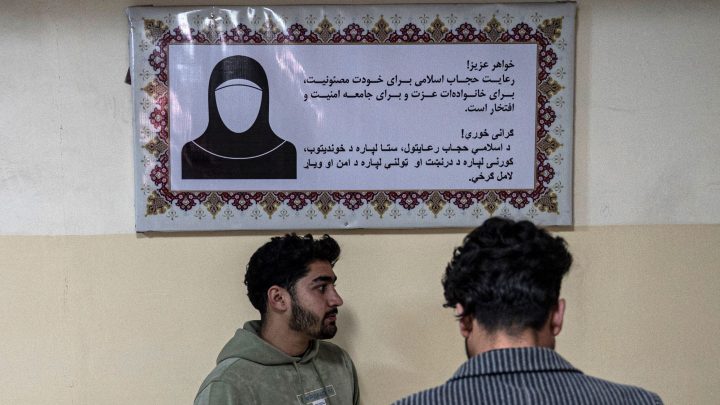
A year after the Taliban barred women from universities, many remain bereft of options
A year after the Taliban barred women from universities, many remain bereft of options

Shortly after the Taliban banned women from attending universities in Afghanistan in December 2022, we spoke with three students who’d been forced to leave their schools. All were heartbroken to have their education interrupted and were uncertain about what the future held.
Now, just over a year after the ban, one woman is studying abroad, one is doing her best to learn English despite the obstacles, and one is married.
Maria Malikzada, 25, had been planning to get married after she finished her degree. She was studying to be a lawyer at a university in Kandahar Province and had been working for an NGO. But the Taliban has limited the jobs women can do and working for an NGO isn’t an option for them anymore. So, this year, her fiancé said: Why are we waiting?
“My fiancé said ‘You are not working and not allowed to work or study. So it’s time to get married,’” said Malikzada. “So, now I’m married. Like, forced marriage. Because there was nothing to do.”
Malikzada said she wanted to get married eventually — but not like this. Now, she lives with her husband and father-in-law, and she’s pretty down. “I’m empty,” she said. “No goal, no job.”
According to UNESCO, Afghanistan is the only country in the world to formally prohibit women from getting an education. The World Bank has warned this ban is hurting the country’s prospects for economic growth. Already, about two-thirds of households in Afghanistan don’t have enough income to meet their basic needs.
And many Afghan women have had to put their career dreams on hold as many of the gains made in the past two decades were largely erased.

Take 16-year-old Sofia Orya, who lives in Kabul. She had to leave 10th grade in August 2021. (Before the university ban, the Taliban barred girls from attending school beyond sixth grade.) She had been taking English classes at a nearby university when the ban on higher education went into effect.
She was hoping to become a pilot. “But seeing this situation, it seems a little bit impossible,” she said.
After being forced to leave school, Orya tried taking English courses online, but often the power was out.
“There were so many internet connection problems, as well as electricity. When we don’t have electricity, our teacher has no access to Zoom,” said Orya. “Because of this, I quit.”
Since then, Orya’s family has been paying for her to take some private in-person English lessons. But she said it’s incredibly frustrating to be denied access to a formal education.
“If there’s any chance for us — if it is math class, if it is physics, it doesn’t matter for us. Just — we want to learn something,” said Orya.
Some Afghan women are managing to get an education elsewhere. When 19-year-old Wurranga Arif was forced to leave her university in Afghanistan, she left the country. She got a scholarship to study electrical engineering in Dubai.
“It’s like I found something that I lost,” Arif said.
Afghanistan puts lots of restrictions on women traveling, and Arif said that leaving the country was difficult. She isn’t planning to go back home until she finishes her degree. And if she does return, she won’t be able to use it.

“The little children are not allowed to go to school, so how would they let me work in electrical engineering? That’s not possible,” said Arif.
Arif has the pre-Taliban Afghan flag hanging on the wall of her room in Dubai. She said it makes her sad that her country won’t make use of her talent.
Because to keep the power on, Afghanistan needs engineers like her.
There’s a lot happening in the world. Through it all, Marketplace is here for you.
You rely on Marketplace to break down the world’s events and tell you how it affects you in a fact-based, approachable way. We rely on your financial support to keep making that possible.
Your donation today powers the independent journalism that you rely on. For just $5/month, you can help sustain Marketplace so we can keep reporting on the things that matter to you.

















